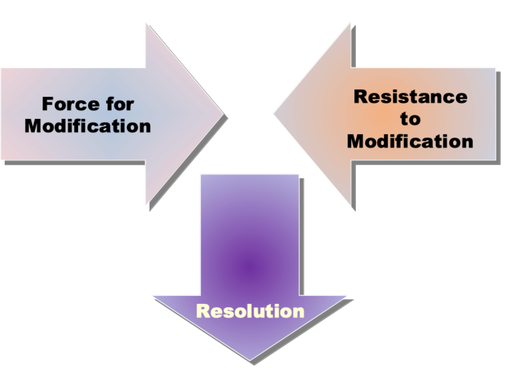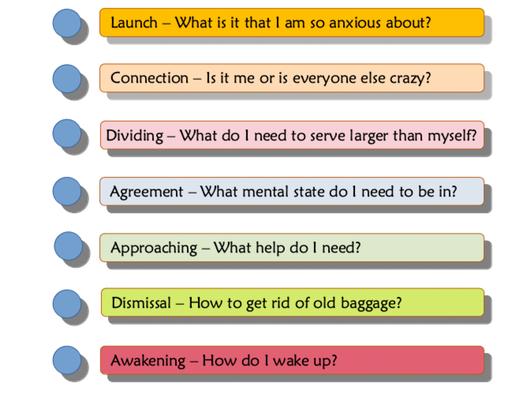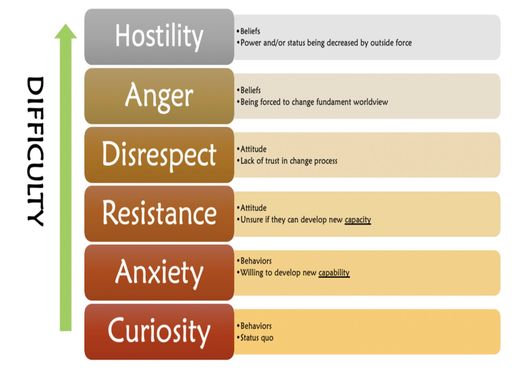Personal Leader Transformation in a Post Trauma World
By Reverend Charles Grantham, Ph.D., MSH, FAIS, APF
*This is an article from the Winter 2020/2021 issue of Contentment Magazine.

Photo by Suzanne D. Williams
We are living in a period of almost unprecedented multiple traumas: a pandemic, economic dissent, social unrest, and political paralysis. Yes, times like this have presented themselves before, but probably not in the direct experience of our lives. This article is the first in a two-part series. I will speak mostly from the perspective of a person’s relationship to their work life and from personal experience as a trauma survivor.
This installment will focus on why you should care and what’s the story? I’ll follow up in the next issue with examples of personal leadership transformation and some suggested next steps for you.
So What?
The revolution in the workplace and our relationship to work are accelerating exponentially. The COVID19 pandemic and collapse of global commerce was merely a fuse that lit the rocket ship which was already primed for liftoff.
These long-term trends are now becoming the new normal. The issue is how the new normal will become the sustainable natural. The old social contract in the workplace focused on the employer taking responsibility for employee’s development and relevance to the work they were doing for the organization. That contract began losing altitude in the 1990’s and the elimination of it was an unspoken reality by the early 2000’s.
Let’s start with the reality, aside from all the political pundits and commercially motivated ‘media.’ Point number 1 is that the basic relationship between a person and the employer is quickly evolving. Soon (within 5 years) a new category of legal relationships will emerge which doesn’t even exist in case law or legal precedent today. People will become enterprises onto themselves and behave accordingly. Do you know how to do that? What development strategies will you deploy to cope with those systemic changes? My guess is that you don’t have answers to those questions and that is why you should care about what I am going to offer.
What’s the story?
What is required in a post COVID-19 world? Let me re-frame this discussion a bit. It is NOT Change Management; it IS Leadership Transformation. Change management implies incremental modifications in existing processes and is associated with management fashions of the industrial age.2 Leadership transformation is about adopting new belief systems, associated attitudes, and ultimately, evolutionary supportive behaviors in the workplace. There is no return to the old pre-COVID19 normal.
I’ve seen this movie before. I have lived through and survived this kind of transformation. The good news is that there is hope if you set the right intention. This transformation has three dialectically related parts: first, the force for modification – a thesis; second, the resistance to that modification – an antithesis; and finally, a resolution of that conflict – a synthesis.

Force for Modification
The force for modification is the process of transformation told as a story. It is a seven-step process that leaders pass through as they adopt new belief systems. Examples include Joseph Campbell’s “The Hero’s Journey”3 or a commonly used screenplay technique called “Save The Cat.”4 The steps and key questions look like this:

You go through this process in ordered steps. You usually encounter a mentor or ‘helper’ between stages 2 (connection) and 3 (dividing) when you enter the realm of the unknown. Along the way, there are challenges, a transformative “dark night of the soul” (stage 6 – dismissal), and finally, a return to the known with a gift of new insight and motivation. At each stage, a key question is presented which must be solved before moving forward, sort of like being given Koan’s to solve during Zen training.5
Resistance to Modification
While you (the Hero in the story) are traveling through this process, you will be met with resistances – some internal and most external.
When faced with a life situation that requires people to change their behavior, attitudes or ultimately their entire belief systems, people resist. It’s not so much they resist the change; they are fighting against having change forced on them. The deeper the change required, the more severe the reaction.
Until people realize that the pain to remain in the current state is greater than the pain to make the change, people will resist. For example, think of the pain involved in:
- Weight Watchers requiring behavior and attitude adjustment.
- Military indoctrination requiring complete behavior and attitude adoption of new peer groups.
- Addiction recovery requiring new behaviors, attitudes, social groups, and acceptance of new beliefs – the proverbial “Come to Jesus” moment. Let’s scale that.

This diagram shows the severity of resistance scales from mild curiosity to outright hostility. Much of our current social unrest can be understood as a reaction to a set of traditional beliefs about power and status relations between economic and racial groups being called into question.
Adapting to this resistance begins at the bottom (level 0) – meeting people where they are currently. Next up is Level 1, and so on. Experience tells us that it takes approximately six months of concentrated personal development to move through each of these levels.6
Reconciling the Forces
So, how can you reconcile the pull of forces for modification with the push of resistances? Your primary task while passing through this transition is to reconcile, or resolve, these forces of change and resistance. I believe the most expeditious way to do this is to employ a guided social-psychological activity of engagement. Don’t run away, hide or go into denial. Confront it and actively engage. In the context presented here, work engagement is defined as the:
“Harnessing of organization member’s selves to their work roles: in engagement, people employ and express themselves physically, cognitively, emotionally and mentally during role performances.”7
Your development task is to “stage-manage” your experience of the workplace. Just think of the changes in work COVID19 has brought. Most of you are working on a new ‘stage’ – at home. The lights, camera, and audience have all changed. Zoom anyone?
The good news is that engagement can be reliably measured to track the transformation process’s effectiveness.8 Remember the old saw, “If you can’t measure it, you can’t manage it”? The same applies to transformation. There are three major components to engagement in the context of transformation: cognition (thinking); engagement with work tasks, emotional attachment to functions and team members; and their experience of the environment’s physical aspects.9
Wrap Up
Successfully navigating through and beyond the chaos and traumas of 2020 is about Personal Leadership Transformation – not change management. This process has three parts: your motivation for evolution and the journey you need to embark upon; your work organization’s resistance to having their behaviors, attitudes, and beliefs changed; and the guidance system of measured engagement used to steer the course.
What are some specific examples of this kind of transformation? What should your next steps be? That’s the topic of the next article.This Personal Leadership Transformation is especially relevant in the supposed ‘return to work’ transition following extended periods of isolation and dislocation. The cognitive and emotional vectors of engagement are of prime importance. Hence, we need transformed leaders, not ‘up-skilled managers.”
References
- https://stress.org/wp-content/themes/Avada-child/lib/3d-flip-book/3d-flip-book/?mag_id=16470, 72-76.
- https://is.theorizeit.org/wiki/Management_fashion_theory
- https://en.wikipedia.org/wiki/Hero’s_journey
- https://en.wikipedia.org/wiki/Blake_Snyder
- https://www.learnreligions.com/introduction-to-koans-449928
- “The Future of Work: The Promise of the New Digital Work Society” C. Grantham (2000) McGraw-Hill: New York (Chapter 4).
- https://en.wikipedia.org/wiki/Work_engagement#cite_note-1
- https://www.stress.org/wp-content/themes/Avada-child/lib/3d-flip-book/3d-flip-book/?mag_id=17649, 30-34.
- There is a rich research literature on this topic that is beyond the scope of this introductory discussion. If you want to explore this in more detail, please contact the author, Charles Grantham, at mailto:[email protected], for a white paper.
ABOUT THE AUTHOR
 Reverend Charles Grantham, Ph.D., MSH, FAIS, APFis the Founder of the Awakening to wholeness.net where he pursues his priorities of teaching, writing, speaking, and mentoring. Focused now on wellness, wellbeing, and wholeness. He received his Ph.D. in Sociology from the University of Maryland in 1980. He has published eleven books and several dozen technical papers. He is a frequent speaker at international events and a “go-to” resource for the media on a wide range of workplace issues—ranging from psychology to public policy. He also is a certified master of Healing Arts is a credentialed Reiki Master/Teacher. He is a Viet Nam combat veteran having served 8 years in the U.S.Army as a Chief WarrantOfficer in the Intelligence Corps. That time was followed by successful careers in academia as a professor and in multi-national technology companies as an Executive Director of Research and development.He has now retired and moved to Baja–oh, I mean Tucson, AZ.
Reverend Charles Grantham, Ph.D., MSH, FAIS, APFis the Founder of the Awakening to wholeness.net where he pursues his priorities of teaching, writing, speaking, and mentoring. Focused now on wellness, wellbeing, and wholeness. He received his Ph.D. in Sociology from the University of Maryland in 1980. He has published eleven books and several dozen technical papers. He is a frequent speaker at international events and a “go-to” resource for the media on a wide range of workplace issues—ranging from psychology to public policy. He also is a certified master of Healing Arts is a credentialed Reiki Master/Teacher. He is a Viet Nam combat veteran having served 8 years in the U.S.Army as a Chief WarrantOfficer in the Intelligence Corps. That time was followed by successful careers in academia as a professor and in multi-national technology companies as an Executive Director of Research and development.He has now retired and moved to Baja–oh, I mean Tucson, AZ.
Contentment Magazine
The dictionary defines “content” as being in a state of peaceful happiness. The AIS magazine is called Contentment because we want all of our guests and members to find contentment in their lives by learning about stress management and finding what works best for each them. Stress is unavoidable, and comes in many shapes and sizes that makes being in a state of peaceful happiness seem like a very lofty goal. But happiness is easy to find once you are able to find ways to manage your stress and keep a healthy perspective when going though difficult times in life. You will always have stress, but stress does not always have you!

Leave A Comment
You must be logged in to post a comment.